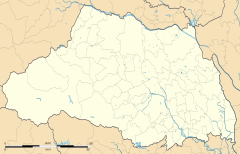Higashi-Matsuyama Station

TJ29 Higashi-Matsuyama Station 東松山駅 | ||||||||||||||||||||||
|---|---|---|---|---|---|---|---|---|---|---|---|---|---|---|---|---|---|---|---|---|---|---|
 The east entrance in November 2011 | ||||||||||||||||||||||
| General information | ||||||||||||||||||||||
| Location | 1-12-11 Yakyū-chō, Higashimatsuyama-shi, Saitama-ken 355–0028 Japan | |||||||||||||||||||||
| Coordinates | 36°02′06″N 139°24′06″E / 36.034909°N 139.401658°E | |||||||||||||||||||||
| Operated by | ||||||||||||||||||||||
| Line(s) | ||||||||||||||||||||||
| Distance | 49.9 km from Ikebukuro | |||||||||||||||||||||
| Platforms | 2 side platforms | |||||||||||||||||||||
| Tracks | 2 | |||||||||||||||||||||
| Connections | Bus terminal | |||||||||||||||||||||
| Construction | ||||||||||||||||||||||
| Structure type | At-grade | |||||||||||||||||||||
| Accessible | Yes | |||||||||||||||||||||
| Other information | ||||||||||||||||||||||
| Station code | TJ-29 | |||||||||||||||||||||
| Website | Official website | |||||||||||||||||||||
| History | ||||||||||||||||||||||
| Opened | 1 October 1923 | |||||||||||||||||||||
| Rebuilt | 2010 | |||||||||||||||||||||
| Previous names | Bushū Matsuyama (until 1954) | |||||||||||||||||||||
| Passengers | ||||||||||||||||||||||
| FY2019 | 28,778 daily | |||||||||||||||||||||
| Services | ||||||||||||||||||||||
| ||||||||||||||||||||||
| ||||||||||||||||||||||
Higashi-Matsuyama Station (東松山駅, Higashimatsuyama-eki) is a passenger railway station located in the city of Higashimatsuyama, Saitama, Japan, operated by the private railway operator Tōbu Railway.[1]
Lines
[edit]Higashi-Matsuyama Station is served by the Tōbu Tōjō Line from Ikebukuro in Tokyo. Located between Takasaka and Shinrin-kōen, it is 49.9 km from the Ikebukuro terminus.[2] All services, (TJ Liner, Kawagoe Limited Express, Rapid Express, Express, Semi Express, Local) stop at this station. During the daytime, the station is served by six trains per hour in each direction.[3]
Station layout
[edit]The station consists of two side platforms serving two tracks, with the station building located above the platforms. The platforms were originally island platforms serving four tracks, but the outer tracks were removed following completion of double-tracking beyond to Shinrin-kōen.
- The west entrance in November 2012
- The ticket barriers in November 2008
Platforms
[edit]| 1 | TJ Tōbu Tōjō Line | for Shinrin-kōen, Ogawamachi, and Yorii |
| 2 | TJ Tōbu Tōjō Line | for Sakado, Kawagoe, and Ikebukuro Y Tokyo Metro Yurakucho Line for Shin-Kiba F Tokyo Metro Fukutoshin Line for Shibuya TY Tōkyū Tōyoko Line for Hiyoshi and Yokohama SH Tōkyū Shin-Yokohama Line for Shin-Yokohama |
- View from the south end of platform 2 looking northward, February 2012
- View from the north end of platform 1 looking southward, December 2015
- View of the north end of the platforms showing the 2-car-length platform extensions, February 2012
- The passenger lift on platform 1 in December 2015
History
[edit]
The station was first opened on 1 October 1923 as Bushū Matsuyama Station (武州松山駅). The station was renamed Higashi-Matsuyama Station in October 1954 when Higashi-Matsuyama became a city.[1][2] The station building was refurbished between 2008 and 2010 with the addition of lifts on either side.
From 17 March 2012, station numbering was introduced on the Tōbu Tōjō Line, with Higashi-Matsuyama Station becoming "TJ-29".[4]
Through running to and from Shin-Yokohama and Shōnandai via the Tōkyū Shin-yokohama Line, Sōtetsu Shin-yokohama Line, Sōtetsu Main Line, and Sōtetsu Izumino Line commenced on 18 March 2023.[3][5] Rapid services were abolished, Rapid Express services were changed to make all stops west of Kawagoe, and F Liner services now operate as Rapid Express services instead of Express services.
Passenger statistics
[edit]In fiscal 2019, the station was used by an average of 28,778 passengers daily.[6] Passenger figures for previous years (boarding passengers only) are as shown below.[7]
| Fiscal year | Daily average |
|---|---|
| 1950 | 4,046 |
| 1960 | 6,725 |
| 1970 | 11,448 |
| 1980 | 13,391 |
| 1990 | 17,131 |
| 2000 | 13,552 |
| 2010 | 13,650 |
Surrounding area
[edit]- Saitama Children's Zoo
- Saitama Prefectural Higashimatsuyama Girls' High School
 National Route 407
National Route 407
See also
[edit]References
[edit]- ^ a b "Higashi-Matsuyama Station information" (in Japanese). Japan: Tobu Railway. Archived from the original on 8 February 2012. Retrieved 9 January 2011.
- ^ a b Terada, Hirokazu (19 January 2013). データブック日本の私鉄 [Databook: Japan's Private Railways]. Japan: Neko Publishing. p. 225. ISBN 978-4-7770-1336-4.
- ^ a b Tobu Tojo Line Timetable, published March 2023
- ^ 「東武スカイツリーライン」誕生! あわせて駅ナンバリングを導入し、よりわかりやすくご案内します [Tobu Sky Tree Line created! Station numbering to be introduced at same time] (PDF). Tobu News (in Japanese). Tobu Railway. 9 February 2012. Archived from the original (PDF) on 8 August 2012. Retrieved 21 March 2012.
- ^ "2023年3月18日(土)ダイヤ改正に係る各列車の時刻変更について" [March 18, 2023 (Saturday) Timetable change for each train due to timetable revision]. Tobu Railway. Archived from the original on 14 March 2023. Retrieved 28 May 2023.
羽沢横浜国大~新横浜~日吉駅間の開業に合わせ、東上線から日吉駅・新横浜駅を経由して海老名駅・湘南台駅までの直通運転を開始します。
[In conjunction with the opening of the Hazawa yokohama-kokudai - Shin-Yokohama - Hiyoshi line, we will start direct operation from the Tojo Line to Ebina Station and Shonandai Station via Hiyoshi Station and Shin-Yokohama Station.] - ^ 駅情報(乗降人員) [Station information: Passenger figures] (in Japanese). Japan: Tobu Railway. 2021. Retrieved 5 January 2021.
- ^ Sawauchi, Kazuaki (October 2013). 東武鉄道東上線の歴史過程 [History of the Tobu Tojo Line]. The Railway Pictorial (in Japanese). 63 (880). Japan: Denkisha Kenkyūkai: 18.
External links
[edit]![]() Media related to Higashi-Matsuyama Station at Wikimedia Commons
Media related to Higashi-Matsuyama Station at Wikimedia Commons
- Tobu station information (in Japanese)







